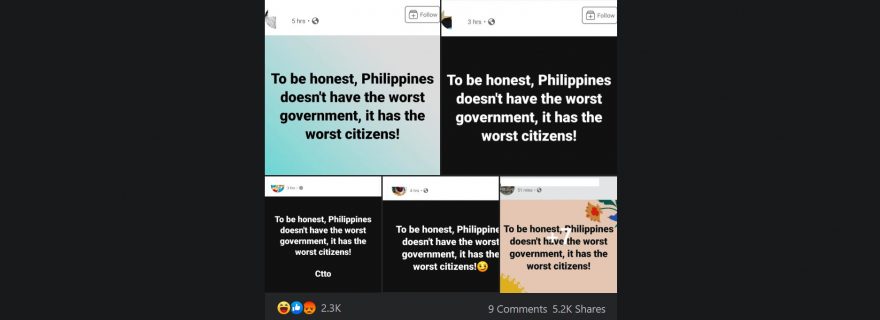The worst of citizens, the best of citizens
What is good citizenship in times of COVID-19? Andrea Ragragio reflects on social media discussions of citizenship in the Philippines.
“To be honest, Philippines doesn’t have the worst government, it has the worst citizens!” screamed the meme on my screen. I saw the slogan pop up a couple of times on my Facebook feed. A high-ranking administrator from my home university even shared it, and received “likes” and approving comments.
Covid-19 in Metro Manila
Like many Filipinos overseas, social media for me is the first go-to to find out how things are at home. At that time (16 March), the number of confirmed Covid-19 cases in the country had more than doubled in a matter of days to 142, and Metro Manila had been placed on lockdown with the Armed Forces manning checkpoints at the borders. President Duterte had already addressed the nation twice, emphasizing that quarantines and curfews were to be implemented, public transportation was to be halted, and that people had to obey.
Nevertheless, in the struggle to carry on with daily life, it seemed that people didn’t, or couldn’t, obey. Metro Manila is a megacity of chronic poverty and homelessness, of mammoth malls and manufacturing hubs that employ people on a “no-work, no-pay” basis, and of a significant (and mostly undocumented) informal economy sector of super-micro retailers, mobile vendors, and small-time transportation providers. In the midst of the lockdown, photos and reports on social media showed people out and about. They had to be.
Discipline in the time of Covid-19
The alarming meme on my screen appeared soon after Duterte’s speeches, rebuking not just those citizens who had “defied” the quarantine, but also those who had been critical of the government’s handling of the crisis. While some derided the meme to be the product of paid online trolls (as Duterte has been reported to have used them), it nonetheless fits with discourse emergent on social media that revolves around discipline in the time of Covid-19.
On social media I saw comments such as, “The people of the Philippines need more discipline than democracy.” They are “pasaway” (should be scolded) or “hard-headed.” An Instagram influencer said: “This is exactly why they need the military because you f*ckers won’t stay at home.” One important thing – if not the most important thing – that anthropology has taught me is to train, and strain, my ears and listen well to what people have to say. Strong words like the ones I see on social media are certainly rattling, but what else is going on?
Citizenship and crisis
I mulled about how the Covid-19 pandemic can open up questions about how crises contribute to constructing citizenship. And with physical distancing now becoming our new normal, the digital world will expectedly play a more crucial role in the interactions and self-curations/identifications that define/redefine notions of citizenship and community. In the case of this meme, it raises the issue of who are these “worst” citizens? What makes them so? If people can actively fashion themselves as good citizens, who gets to mark out “bad” ones, and how?
In the Philippine context, this crisis highlights and reinforces competing notions of good citizenship. On the one hand are those supportive of the government who assert that good citizens are those who are obedient and disciplined, and on the other are those who value citizens who critically ask their government to be efficient and accountable.
Should we expect this tension to intensify in the coming months? Or perhaps, as we settle into a “new normal” and people are more able to enact alternative, horizontal, gestures of “good citizenship” – as is beginning to happen now with stories and images of “mutual aid,” “cooperation,” and “team work” proliferating on social media – will we arrive at an altogether different notion of good citizenship?
Andrea's studies are supported by the University of the Philippines' Faculty, REPS and Administrative Staff Development Program (FRASDP).



0 Comments
Add a comment